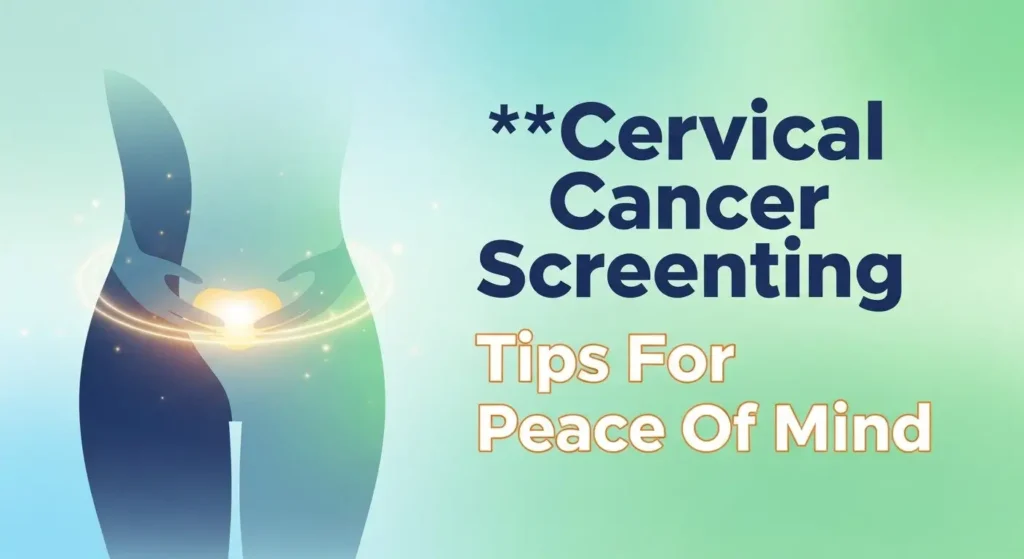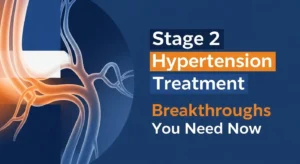Introduction
In our busy lives, it's easy to put off health check-ups. But when it comes to something as important as cervical cancer, staying on top of your screenings can offer immense peace of mind. Cervical cancer screening is a powerful tool designed to find changes in your body before they become serious problems. Think of it as your personal health detective, working to keep you safe and healthy.
This article will walk you through everything you need to know about cervical cancer screening, from understanding why it's crucial to preparing for your appointment and interpreting your results. Our goal is to make the process less daunting and help you feel empowered and informed. Let's explore how these simple, routine tests can protect your health and give you that much-deserved peace of mind.
Key Takeaways
- Early Detection is Key: Regular cervical cancer screenings, like Pap tests and HPV tests, can find abnormal cells early, often before they turn into cancer.
- Know Your Schedule: Most women need screening every 3 to 5 years starting at age 21, but always follow your doctor's personalized advice.
- Preparation is Simple: A few easy steps before your appointment can help ensure accurate results and a more comfortable experience.
- Understanding Results Reduces Worry: Learn what “normal” and “abnormal” results mean and what steps follow, so you're never left guessing.
- Peace of Mind is Priceless: Taking control of your cervical health through regular screening is a proactive step that significantly reduces anxiety and promotes overall well-being.
What is Cervical Cancer?
Cervical cancer is a type of cancer that starts in the cervix, which is the lower, narrow part of the uterus that connects to the vagina. It's usually a slow-growing cancer, meaning it takes several years for normal cells to turn into cancer cells. This slow progression is actually a good thing because it gives us a big window of opportunity to find and treat these changes early through cervical cancer screening.
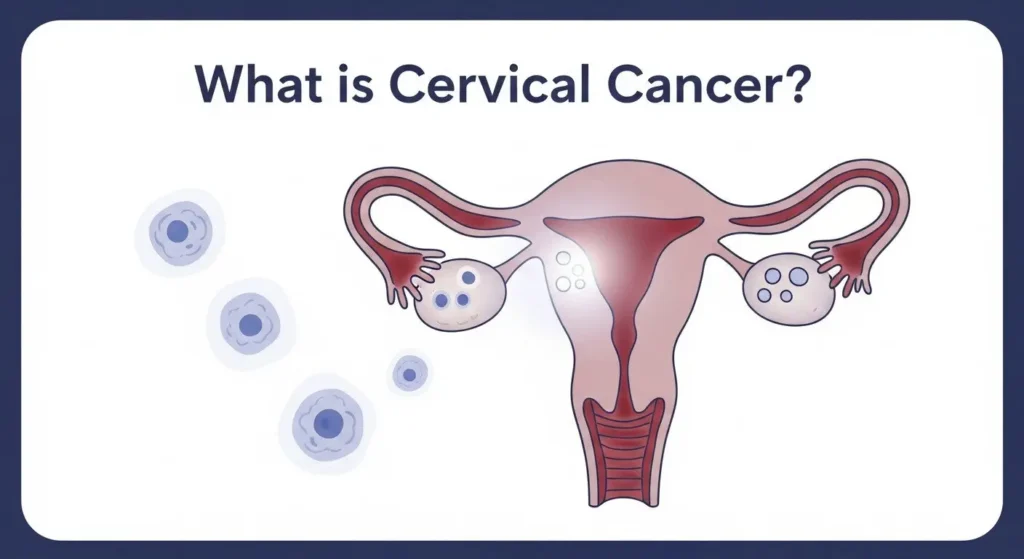
The main cause of almost all cervical cancers is a long-lasting infection with certain types of Human Papillomavirus (HPV). HPV is a very common virus, and most people who are sexually active will get it at some point. For many, their immune system clears the virus naturally. But for some, the virus stays in the body and can cause changes in the cervical cells over time. These changes, if not found and treated, can sometimes lead to cancer.
Did You Know? ✨ Cervical cancer used to be one of the most common causes of cancer death for women, but thanks to screening and the HPV vaccine, those numbers have dropped dramatically!
Why is Cervical Cancer Screening So Important?
Imagine having a superpower that lets you see a problem before it even starts. That's pretty much what cervical cancer screening does! It's not designed to find cancer itself, but rather to find those pre-cancerous cell changes that, if left untreated, could become cancer. This is a huge difference. By finding these changes early, doctors can remove them, preventing cancer from ever developing. This is called prevention or early detection, and it's incredibly effective.
Regular screenings mean:
- Early Detection: Catching abnormal cells before they become cancerous.
- Better Treatment Outcomes: If cancer is found, it's usually at a very early, treatable stage.
- Peace of Mind: Knowing you're taking care of your health reduces anxiety.
- Saving Lives: It's truly one of the most successful cancer prevention stories.
Many people also wonder about other skin health issues, like pimples on shoulders or ear blackhead removal. While not directly related to cervical health, these examples show how important it is to pay attention to your body's signals and seek professional advice when needed, just as with pimples on shoulders or even ear blackhead removal. It's all part of taking care of your overall well-being.
Types of Screening Tests
There are two main tests used for cervical cancer screening:
- The Pap Test (also called a Pap Smear):
- What it does: This test looks for cell changes on the cervix that could lead to cancer.
- How it works: During the test, your doctor gently collects cells from your cervix. These cells are then sent to a lab to be examined under a microscope for any abnormal changes.
- Frequency: Usually done every three years for women aged 21-65, often combined with an HPV test for older women.
- The HPV Test:
- What it does: This test looks for the presence of high-risk types of the Human Papillomavirus (HPV) that are known to cause most cervical cancers.
- How it works: Similar to a Pap test, cells are collected from your cervix. The lab then checks these cells for HPV DNA.
- Frequency: Often done every five years for women aged 30-65, either alone or at the same time as a Pap test (co-testing).
Why Both? For women aged 30 and older, having both tests (co-testing) provides the most comprehensive screening. The Pap test finds cell changes, and the HPV test finds the virus that causes those changes. Together, they offer a very strong defense against cervical cancer.
Cervical Cancer Screening Test Comparison
| Feature | Pap Test (Pap Smear) | HPV Test |
|---|---|---|
| What it detects | Abnormal cells on the cervix | High-risk HPV infection |
| Primary Age Group | 21-65 years old | 30-65 years old (often with Pap) |
| Frequency | Every 3 years (if negative) | Every 5 years (if negative, often with Pap) |
| Goal | Find pre-cancerous cell changes | Find the virus that causes pre-cancerous changes |
| Sample Collection | Cells collected from the cervix with a small brush/spatula | Cells collected from the cervix with a small brush/spatula |
Who Needs Cervical Cancer Screening and When?
The guidelines for cervical cancer screening can seem a bit confusing, but your doctor will help you follow the right schedule for you. Here are the general recommendations:
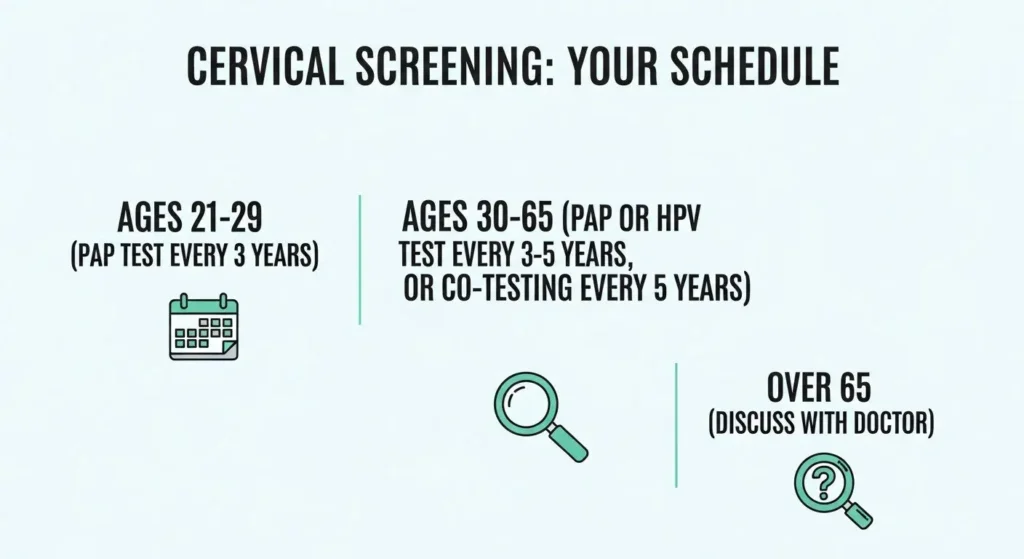
- Ages 21-29: A Pap test is recommended every three years. HPV testing alone is not recommended for this age group unless there's an abnormal Pap test result.
- Ages 30-65: You have a few options:
- A Pap test every three years.
- An HPV test every five years.
- Co-testing (Pap test and HPV test together) every five years. This is often the preferred method as it offers the most complete screening.
- Over 65: If you've had regular screenings with normal results for many years, your doctor might tell you that you can stop screening. This decision is made with your healthcare provider.
- Women who have had a hysterectomy: If your cervix was removed as part of your hysterectomy and you have no history of cervical cancer or severe pre-cancer, you may not need screening. Discuss this with your doctor.
Important Note: These are general guidelines. Your doctor might recommend a different schedule based on your personal health history, such as if you have a weakened immune system or a history of abnormal Pap tests. Always follow your doctor's advice!
Preparing for Your Cervical Cancer Screening
Getting ready for your cervical cancer screening is simple and can help ensure the best results. Here are a few tips:
- Avoid certain activities for 2 days before:
- Douching
- Using vaginal medicines or creams
- Using spermicides or vaginal contraceptives
- Having vaginal intercourse
- Using tampons
- These can wash away or hide abnormal cells.
- Schedule wisely: Try to schedule your appointment when you are not having your menstrual period. If you have light bleeding, it might still be okay, but heavy bleeding can make the test harder to read.
- Be open with your doctor: Don't be shy! Tell your doctor about any concerns, your sexual health history, or if you've had abnormal Pap tests before.
- Ask questions: If you're nervous or unsure about anything, ask. Your healthcare provider is there to help you feel comfortable and informed.
“Taking a few simple steps to prepare for your screening can make all the difference in getting clear, accurate results and putting your mind at ease.”
What Happens During the Screening?
The thought of a cervical cancer screening might make some people feel a bit anxious or embarrassed, but knowing what to expect can really help. The actual procedure is usually quick, lasting only a few minutes.

Here’s a step-by-step look for cervical cancer screening:
- Check-in and Privacy: You'll check in, and a nurse or medical assistant will take you to a private exam room. They'll ask you to change into a gown.
- Discussion: Your doctor or nurse will come in, discuss your health history, and answer any questions you might have. This is a great time to voice any concerns or anxieties.
- Positioning: You'll lie on an exam table with your feet in stirrups. Your doctor will help you get into a comfortable position.
- The Speculum: The doctor will gently insert a plastic or metal tool called a speculum into your vagina. This tool helps to hold the vaginal walls open so the doctor can see your cervix. It might feel a bit of pressure or coolness, but it shouldn't be painful. If you feel uncomfortable, tell your doctor.
- Cell Collection: Using a small brush or spatula, the doctor will gently collect cells from your cervix. This usually feels like a slight scrape or brush. It’s quick!
- Removal: The speculum is then gently removed.
- Afterward: You can get dressed and resume your normal activities immediately. There might be some very light spotting afterward, which is normal.
Remember, healthcare providers do this many times a day. They are professionals and want to make you as comfortable as possible. Deep breaths can help!
Understanding Your Results
Waiting for results can be the hardest part, but understanding what they mean can help manage any anxiety. Your doctor's office will usually contact you within a few weeks.
Normal Results (Negative)
Good news! A normal result means no abnormal cells were found on your cervix (for a Pap test) or no high-risk HPV was detected (for an HPV test). You can continue your regular screening schedule as recommended by your doctor. This is the peace of mind we're looking for!
Abnormal Results (Positive)
If your results come back abnormal, don't panic! An abnormal result does not mean you have cancer. It simply means that some cell changes were found or that you tested positive for high-risk HPV. Most abnormal results are caused by HPV and resolve on their own.
Depending on the type of abnormality, your doctor might recommend:
- Watchful Waiting: Sometimes, for minor changes, the doctor might suggest waiting a few months and then repeating the Pap or HPV test to see if your body clears the changes on its own.
- Colposcopy: This is a closer look at your cervix using a magnifying instrument called a colposcope. During a colposcopy, the doctor might take small tissue samples (biopsies) for further examination.
- Treatment: If significant pre-cancerous cells are found, treatments like LEEP (Loop Electrosurgical Excision Procedure) or cryotherapy might be used to remove the abnormal cells. These procedures are very effective and usually done in the doctor's office.
Key Point: Follow-up is crucial for abnormal results. Your doctor will guide you through the next steps and ensure you get the care you need.
Addressing Common Concerns & Fears
It's completely normal to have worries about cervical cancer screening. Let's tackle some of the most common ones:
- “It's going to hurt.” While it might be a little uncomfortable or feel like pressure, it's usually not painful. The entire process of cell collection is very quick. If you do feel pain, speak up immediately! Your doctor can make adjustments.
- “I'm embarrassed.” Many people feel this way. Remember, healthcare providers are professionals. They've seen it all, and their focus is purely on your health. They are there to help, not to judge.
- “What if they find something bad?” This is a huge fear, but remember the purpose of screening: to find changes early, often before they become cancer. Early detection means better outcomes. Facing the test is much better than ignoring potential problems.
- “I don't have time.” Your health is worth prioritizing! Schedule it like any other important appointment. Many clinics offer flexible hours.
- “I'm afraid of the results.” This is a valid feeling. However, not knowing can be more stressful in the long run. Getting screened means you're taking control and giving yourself the best chance for good health.
Tip: Bring a friend or family member for support, listen to music, or practice deep breathing exercises during the appointment if it helps you feel calmer.
The Role of HPV Vaccine
While screening is about finding changes, the HPV vaccine is about preventing the infection that causes most of these changes in the first place! Think of it as a double layer of protection.
- What it is: The HPV vaccine protects against the types of HPV that cause about 90% of cervical cancers, as well as many other HPV-related cancers (like anal, vaginal, vulvar, penile, and oral cancers).
- Who it's for: It's recommended for preteens (girls and boys) at age 11 or 12, but can be given up to age 26 for those who haven't been vaccinated. Some adults aged 27-45 who are not already vaccinated might also consider it after discussing with their doctor.
- Why it's important: Vaccinating before exposure to HPV means the body can build strong protection. It's a powerful tool in the fight against cervical cancer.
Even if you've had the HPV vaccine, regular cervical cancer screenings are still important. The vaccine protects against most high-risk HPV types, but not all, so screening remains a vital part of your health routine.
Lifestyle Choices for Cervical Health
While screening and vaccination are critical, your everyday lifestyle choices also play a role in your overall health, including cervical health.

- Healthy Diet: Eating plenty of fruits, vegetables, and whole grains supports your immune system, which helps your body fight off infections like HPV.
- Regular Exercise: Staying active boosts your immune system and overall well-being.
- Avoid Smoking: Smoking significantly increases the risk of cervical cancer in women infected with HPV. Quitting smoking is one of the best things you can do for your health.
- Safe Sexual Practices: Using condoms consistently and correctly can reduce the risk of HPV transmission and other sexually transmitted infections (STIs).
- Manage Stress: Chronic stress can weaken your immune system. Finding healthy ways to manage stress, like meditation or hobbies, is beneficial.
These healthy habits aren't just good for your cervix; they contribute to your entire body's health, from preventing issues like blackheads on lips to protecting against more serious conditions.
Debunking Myths About Cervical Cancer Screening
Misinformation can lead to fear and delay vital screenings. Let's clear up some common myths:
- Myth 1: “I don't need screening if I've had the HPV vaccine.”
- Fact: While the vaccine is highly effective, it doesn't protect against all types of HPV that can cause cancer. Also, if you were already exposed to HPV before vaccination, you still need screening. Keep up with your regular check-ups!
- Myth 2: “I don't need screening if I'm not sexually active.”
- Fact: While HPV is primarily transmitted through sexual contact, rare cases can occur without it. Also, if you were sexually active in the past, HPV can stay dormant for years before causing cell changes.
- Myth 3: “I'm too old for screening.”
- Fact: Screening guidelines usually recommend stopping at age 65 if you've had consistent normal results for many years. However, this is a discussion to have with your doctor, as some women may still benefit from screening past this age.
- Myth 4: “Cervical cancer screening is only for women.”
- Fact: While cervical cancer affects women, the HPV virus affects men too and can cause other cancers. Men should also be aware of HPV and discuss vaccination with their doctors, similar to how they prioritize men's prostate health supplements and other health needs.
- Myth 5: “If I have HPV, I will get cervical cancer.”
- Fact: Most HPV infections clear up on their own without causing any problems. Only a small percentage of persistent high-risk HPV infections lead to pre-cancerous changes and, eventually, cancer. Screening helps catch these persistent infections early.
Empowering Yourself: Asking Questions
Your healthcare journey is a partnership between you and your doctor. Being an active participant means asking questions! Don't be afraid to speak up. Here are some questions you might ask:
- “When was my last Pap test/HPV test, and when should I schedule my next one?”
- “What do my results mean, and do I need any follow-up?”
- “What are the risks and benefits of each screening option for someone my age?”
- “What can I do to reduce my risk of cervical cancer?”
- “What are the signs or symptoms I should watch out for?”
- “Can you explain the procedure again? I'm a bit nervous.”
- “Is the HPV vaccine right for me?”
Remember, no question is silly when it comes to your health. A good doctor will welcome your questions and make sure you feel fully informed.
Making Screening a Routine
Just like brushing your teeth or getting a car oil change, cervical cancer screening needs to become a regular part of your health routine. Consistency is key to its effectiveness.
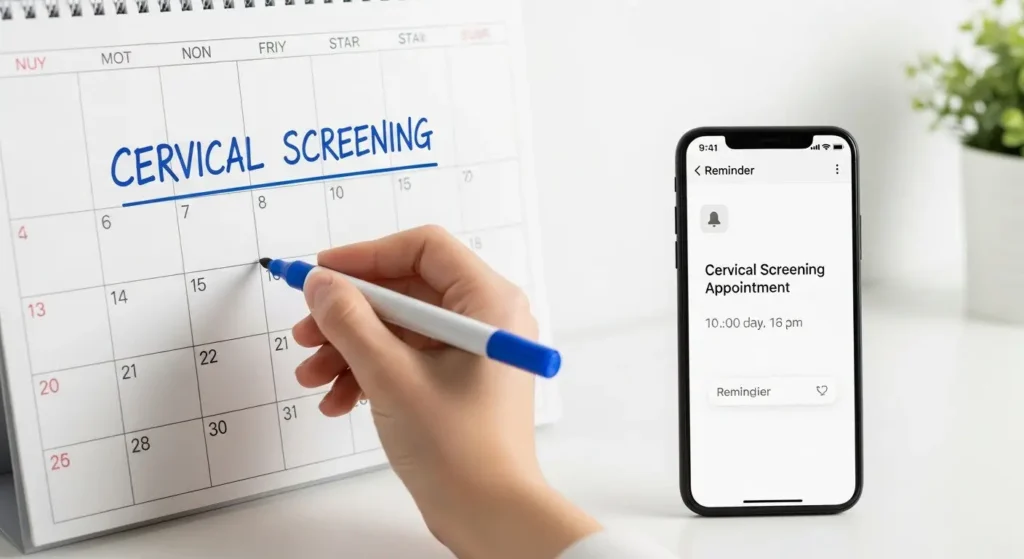
- Set Reminders: Mark your calendar, set a phone alarm, or use a health app to remind you when your next screening is due.
- Talk to Your Doctor Annually: Even if you don't need a Pap or HPV test every year, your annual physical is a great time to discuss your screening schedule and any other health concerns.
- Encourage Others: Share the importance of screening with friends and family. You might inspire someone else to take charge of their health!
- Overcome Barriers: If cost, transportation, or time are issues, talk to your doctor's office or a local health clinic. Many programs are available to help.
By making it a routine, you're not just getting a test; you're building a habit of proactive health management that pays off in long-term peace of mind. Regular check-ups for all health aspects, including skin cancer prevention, are crucial for a healthy life.
Beyond the Screen: Follow-up and Support
If your screening results are abnormal, it's natural to feel worried. But remember, an abnormal result is a call to action, not a diagnosis of cancer. The follow-up care is designed to prevent cancer.
- Understand Your Next Steps: Make sure you clearly understand what your doctor recommends. If it's a repeat test, a colposcopy, or a treatment, ask about the purpose, what to expect, and any risks.
- Don't Delay Follow-Up: This is perhaps the most important advice. Delaying follow-up appointments can allow abnormal cells to progress. Prompt action is your best defense.
- Seek Support: Talk to trusted friends, family, or a support group if you're feeling anxious. Your healthcare team can also provide resources and emotional support.
- Stay Informed: Continue to educate yourself, but rely on credible sources like your doctor or reputable health organizations.
Your healthcare team is there to guide you through every step, ensuring you receive the best care and support.
Connecting Cervical Health to Overall Well-being
Cervical health isn't a standalone issue; it's deeply connected to your overall well-being. When you prioritize one aspect of your health, it often has positive ripple effects on others.
- Holistic Health: Taking care of your cervical health is part of a larger picture of self-care, including mental, emotional, and physical health.
- Empowerment: Being proactive about screening empowers you, giving you a sense of control over your health destiny. This empowerment can extend to other areas of your life.
- Reduced Stress: Knowing you're up-to-date with screenings significantly reduces health-related anxiety, allowing you to focus on other aspects of a fulfilling life.
Let's embrace a comprehensive approach to health. From understanding the causes and fixes for issues like blackheads on lips to ensuring regular preventative screenings, every step you take contributes to a healthier, happier you.
Conclusion
Cervical cancer screening is a simple yet incredibly powerful tool for your health. By understanding what it is, why it's important, and what to expect, you can approach your appointments with confidence and reduce any anxiety. Remember, these routine tests are designed to catch potential problems early, often preventing cancer from ever developing.
Now, make the commitment to prioritize your cervical health. Schedule your screenings, ask questions, and empower yourself with knowledge. Doing so isn't just about a medical check-up; it's about investing in your long-term health, protecting your future, and gaining invaluable peace of mind. Your health is your wealth – take care of it!

